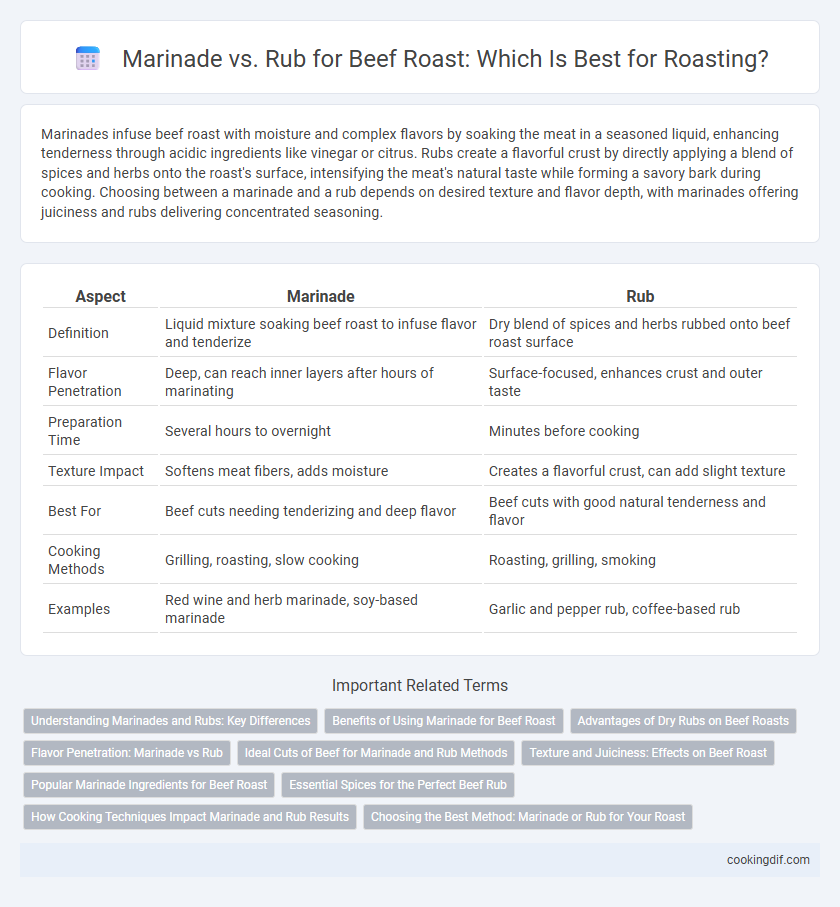Marinades infuse beef roast with moisture and complex flavors by soaking the meat in a seasoned liquid, enhancing tenderness through acidic ingredients like vinegar or citrus. Rubs create a flavorful crust by directly applying a blend of spices and herbs onto the roast's surface, intensifying the meat's natural taste while forming a savory bark during cooking. Choosing between a marinade and a rub depends on desired texture and flavor depth, with marinades offering juiciness and rubs delivering concentrated seasoning.
Table of Comparison
| Aspect | Marinade | Rub |
|---|---|---|
| Definition | Liquid mixture soaking beef roast to infuse flavor and tenderize | Dry blend of spices and herbs rubbed onto beef roast surface |
| Flavor Penetration | Deep, can reach inner layers after hours of marinating | Surface-focused, enhances crust and outer taste |
| Preparation Time | Several hours to overnight | Minutes before cooking |
| Texture Impact | Softens meat fibers, adds moisture | Creates a flavorful crust, can add slight texture |
| Best For | Beef cuts needing tenderizing and deep flavor | Beef cuts with good natural tenderness and flavor |
| Cooking Methods | Grilling, roasting, slow cooking | Roasting, grilling, smoking |
| Examples | Red wine and herb marinade, soy-based marinade | Garlic and pepper rub, coffee-based rub |
Understanding Marinades and Rubs: Key Differences
Marinades for beef roast penetrate the meat, combining acidic ingredients like vinegar or citrus to tenderize and infuse deep flavors, while rubs create a flavorful crust by applying a mixture of spices and herbs directly to the surface. Marinades require time to soak, often several hours or overnight, enhancing moisture and texture, whereas rubs can be applied shortly before cooking to develop a concentrated, caramelized seasoning. Understanding these distinctions helps optimize flavor profiles and cooking methods for perfectly seasoned beef roasts.
Benefits of Using Marinade for Beef Roast
Using a marinade for beef roast enhances flavor penetration and tenderizes the meat by breaking down muscle fibers with acidic ingredients such as vinegar, wine, or citrus juice. Marinades also add moisture, preventing dryness during cooking and resulting in a juicier roast. The infusion of herbs, spices, and aromatics in marinades creates a complex, balanced taste profile that rubs often can't achieve due to their surface-level application.
Advantages of Dry Rubs on Beef Roasts
Dry rubs enhance beef roast flavor by creating a concentrated crust that locks in natural juices and intensifies savory notes. Unlike marinades, dry rubs require minimal preparation time and do not dilute the meat's texture, preserving a firmer, more appealing bite. Their blend of herbs, spices, and salt also promotes a caramelized exterior during roasting, resulting in a rich, deeply layered taste profile.
Flavor Penetration: Marinade vs Rub
Marinades enhance flavor penetration in beef roast by allowing acidic and enzymatic ingredients to break down muscle fibers, resulting in deeper seasoning throughout the meat. Rubs primarily impact the surface, creating a flavorful crust through spices and herbs without significantly permeating the interior. For intense internal flavor, marinating is more effective, while rubs excel in enhancing texture and surface taste.
Ideal Cuts of Beef for Marinade and Rub Methods
Tender cuts like ribeye, sirloin, and tenderloin benefit from rubs that enhance flavor without overpowering their delicate texture. Marinades are ideal for tougher cuts such as chuck, brisket, and flank steak, as the acidic components break down connective tissues, resulting in a more tender roast. Selecting the right method--rub for naturally tender cuts and marinade for robust, fibrous beef--ensures optimal flavor infusion and texture in the final roast.
Texture and Juiciness: Effects on Beef Roast
Marinades penetrate beef roast fibers, enhancing juiciness by breaking down proteins and allowing moisture retention during cooking. Rubs create a flavorful crust that intensifies texture but do not significantly affect internal moisture levels. Combining both methods can optimize tenderness and surface flavor, balancing juiciness and texture in the final roast.
Popular Marinade Ingredients for Beef Roast
Popular marinade ingredients for beef roast include soy sauce, red wine, garlic, olive oil, and Worcestershire sauce, which enhance the meat's flavor and tenderness through enzymatic breakdown. Herbs such as rosemary, thyme, and black pepper are commonly added for aromatic depth, while acidic components like vinegar or citrus juice help break down muscle fibers. Using these ingredients in a marinade allows flavors to penetrate deeply, creating a juicy and flavorful roast compared to a dry rub.
Essential Spices for the Perfect Beef Rub
Essential spices for the perfect beef rub include black pepper, garlic powder, smoked paprika, and ground cumin, which enhance the natural flavors of a roast while creating a flavorful crust. Unlike marinades that infuse moisture and penetrate deeper, rubs concentrate bold, textured seasoning on the surface, ideal for roasting or grilling beef. Incorporating brown sugar or chili powder adds a balanced sweetness and subtle heat to elevate the savory profile of the beef.
How Cooking Techniques Impact Marinade and Rub Results
Marinating a beef roast infuses moisture and tenderizes the meat by breaking down muscle fibers through acidic or enzymatic ingredients, enhancing flavor absorption during slow cooking. Applying a dry rub creates a flavorful crust through Maillard reaction, locking in juices and intensifying the roast's external texture when exposed to high heat. Selecting between marinade and rub depends on the desired tenderness, flavor penetration, and cooking method, with marinades excelling in slow, moist heat and rubs maximizing taste in dry heat environments.
Choosing the Best Method: Marinade or Rub for Your Roast
Choosing between a marinade or rub for your beef roast depends on the desired flavor intensity and texture. Marinades, often with acidic components like vinegar or citrus, tenderize the meat while infusing deep flavors during hours of soaking. Rubs, typically consisting of herbs, spices, and salt, form a flavorful crust that enhances the roast's exterior when cooked, offering a more concentrated taste without altering the meat's texture.
Marinade vs rub for beef roast Infographic

 cookingdif.com
cookingdif.com